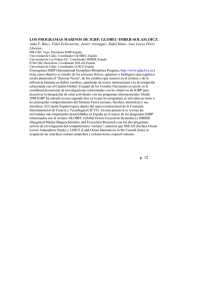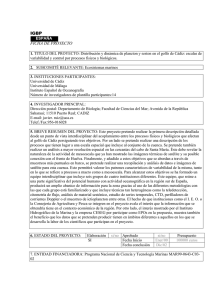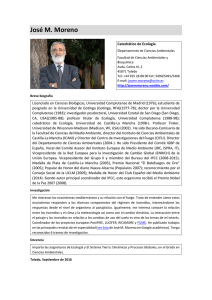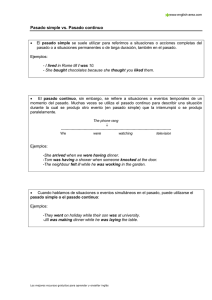Informe del Tercer Congreso de IGBP Report from the Third IGBP
Anuncio
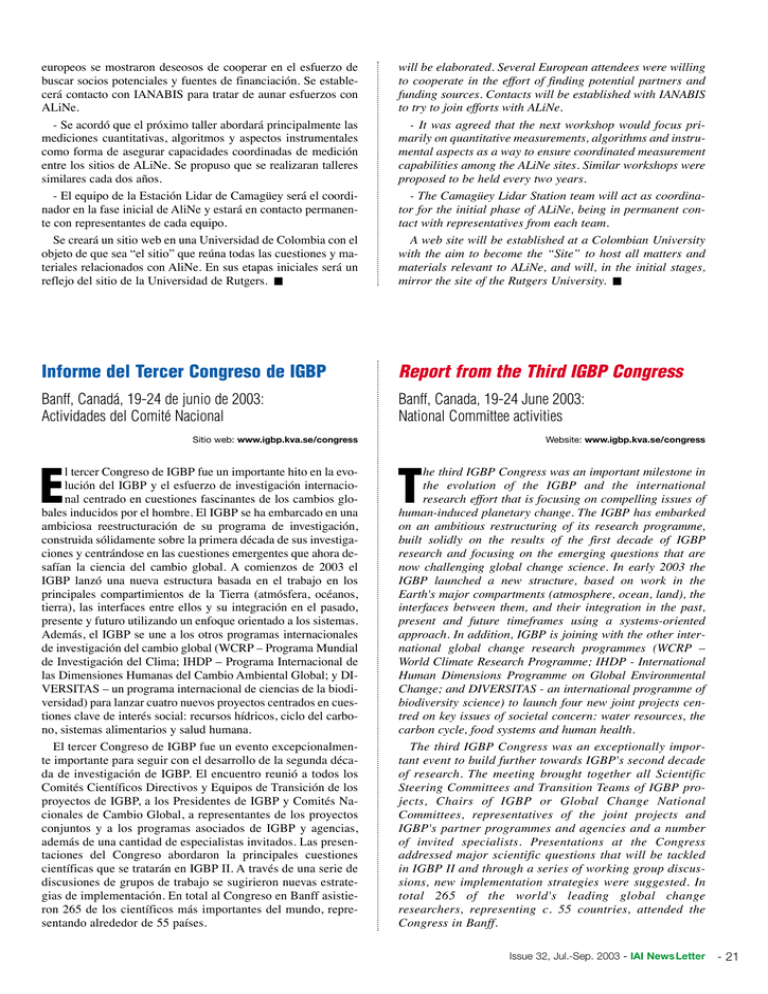
europeos se mostraron deseosos de cooperar en el esfuerzo de buscar socios potenciales y fuentes de financiación. Se establecerá contacto con IANABIS para tratar de aunar esfuerzos con ALiNe. - Se acordó que el próximo taller abordará principalmente las mediciones cuantitativas, algoritmos y aspectos instrumentales como forma de asegurar capacidades coordinadas de medición entre los sitios de ALiNe. Se propuso que se realizaran talleres similares cada dos años. - El equipo de la Estación Lidar de Camagüey será el coordinador en la fase inicial de AliNe y estará en contacto permanente con representantes de cada equipo. Se creará un sitio web en una Universidad de Colombia con el objeto de que sea “el sitio” que reúna todas las cuestiones y materiales relacionados con AliNe. En sus etapas iniciales será un reflejo del sitio de la Universidad de Rutgers. ■ will be elaborated. Several European attendees were willing to cooperate in the effort of finding potential partners and funding sources. Contacts will be established with IANABIS to try to join efforts with ALiNe. - It was agreed that the next workshop would focus primarily on quantitative measurements, algorithms and instrumental aspects as a way to ensure coordinated measurement capabilities among the ALiNe sites. Similar workshops were proposed to be held every two years. - The Camagüey Lidar Station team will act as coordinator for the initial phase of ALiNe, being in permanent contact with representatives from each team. A web site will be established at a Colombian University with the aim to become the “Site” to host all matters and materials relevant to ALiNe, and will, in the initial stages, mirror the site of the Rutgers University. ■ Informe del Tercer Congreso de IGBP Report from the Third IGBP Congress Banff, Canadá, 19-24 de junio de 2003: Actividades del Comité Nacional Banff, Canada, 19-24 June 2003: National Committee activities Sitio web: www.igbp.kva.se/congress E l tercer Congreso de IGBP fue un importante hito en la evolución del IGBP y el esfuerzo de investigación internacional centrado en cuestiones fascinantes de los cambios globales inducidos por el hombre. El IGBP se ha embarcado en una ambiciosa reestructuración de su programa de investigación, construida sólidamente sobre la primera década de sus investigaciones y centrándose en las cuestiones emergentes que ahora desafían la ciencia del cambio global. A comienzos de 2003 el IGBP lanzó una nueva estructura basada en el trabajo en los principales compartimientos de la Tierra (atmósfera, océanos, tierra), las interfaces entre ellos y su integración en el pasado, presente y futuro utilizando un enfoque orientado a los sistemas. Además, el IGBP se une a los otros programas internacionales de investigación del cambio global (WCRP – Programa Mundial de Investigación del Clima; IHDP – Programa Internacional de las Dimensiones Humanas del Cambio Ambiental Global; y DIVERSITAS – un programa internacional de ciencias de la biodiversidad) para lanzar cuatro nuevos proyectos centrados en cuestiones clave de interés social: recursos hídricos, ciclo del carbono, sistemas alimentarios y salud humana. El tercer Congreso de IGBP fue un evento excepcionalmente importante para seguir con el desarrollo de la segunda década de investigación de IGBP. El encuentro reunió a todos los Comités Científicos Directivos y Equipos de Transición de los proyectos de IGBP, a los Presidentes de IGBP y Comités Nacionales de Cambio Global, a representantes de los proyectos conjuntos y a los programas asociados de IGBP y agencias, además de una cantidad de especialistas invitados. Las presentaciones del Congreso abordaron la principales cuestiones científicas que se tratarán en IGBP II. A través de una serie de discusiones de grupos de trabajo se sugirieron nuevas estrategias de implementación. En total al Congreso en Banff asistieron 265 de los científicos más importantes del mundo, representando alrededor de 55 países. Website: www.igbp.kva.se/congress T he third IGBP Congress was an important milestone in the evolution of the IGBP and the international research effort that is focusing on compelling issues of human-induced planetary change. The IGBP has embarked on an ambitious restructuring of its research programme, built solidly on the results of the first decade of IGBP research and focusing on the emerging questions that are now challenging global change science. In early 2003 the IGBP launched a new structure, based on work in the Earth's major compartments (atmosphere, ocean, land), the interfaces between them, and their integration in the past, present and future timeframes using a systems-oriented approach. In addition, IGBP is joining with the other international global change research programmes (WCRP – World Climate Research Programme; IHDP - International Human Dimensions Programme on Global Environmental Change; and DIVERSITAS - an international programme of biodiversity science) to launch four new joint projects centred on key issues of societal concern: water resources, the carbon cycle, food systems and human health. The third IGBP Congress was an exceptionally important event to build further towards IGBP's second decade of research. The meeting brought together all Scientific Steering Committees and Transition Teams of IGBP projects, Chairs of IGBP or Global Change National Committees, representatives of the joint projects and IGBP's partner programmes and agencies and a number of invited specialists. Presentations at the Congress addressed major scientific questions that will be tackled in IGBP II and through a series of working group discussions, new implementation strategies were suggested. In total 265 of the world's leading global change researchers, representing c. 55 countries, attended the Congress in Banff. Issue 32, Jul.-Sep. 2003 - IAI News Letter - 21 Con el objeto de tratar el tema de la reunión “desarrollar la agenda científica y los enfoques de implementación para la próxima década de investigación del Sistema Terrestre en el marco de IGBP, 2”, el programa del Congreso se desarrolló en una conjunción de discusiones plenarias y de grupos de trabajo pequeños (vea www.igbp.kva.se/congress/). Las charlas científicas estuvieron centradas en los desafíos científicos que esperan al IGBP en la próxima década, con especial énfasis en las interacciones entre los componentes del Sistema Terrestre: Océanos, Atmósfera y Tierra. Se presentaron también perspectivas a largo plazo y de modelado. Colegas de la Asociación para las Ciencias del Sistema Terrestre hicieron presentaciones sobre biodiversidad, sistemas acoplados humanosnaturales y el sistema físico del clima. También se presentaron ideas del análisis de sistemas complejos para estimular nuevos enfoques en la comunidad del cambio global. Los días centrales de la reunión se dedicaron a una intensa serie de discusiones de grupos de trabajo que debatieron temas científicos candentes para el futuro. Algunos grupos de trabajo se abocaron a la búsqueda de soluciones prácticas para la implementación de la ciencia de los proyectos nuevos en desarrollo bajo Planes Científicos y Estrategias de Implementación. Los informes de estas discusiones darán un aporte crítico al Plan Científico/Estrategia de Ejecución tanto del IGBP II como de proyectos específicos. Además de la Reunión de los Presidentes de los Comités Nacionales y las reuniones de los Comités Científicos Directivos y Equipos de Transición, se realizó una sesión de posters con las presentaciones de los Comités Nacionales, que permitió generar un foro para el intercambio de ideas e información sobre la investigación del cambio global que se lleva a cabo en el mundo (vea http://www.igbp.kva.se/congress/posters.html). En el penúltimo día, muchos científicos dieron su opinión sobre las discusiones que tuvieron lugar en el Congreso y pusieron de relieve la complejidad de hacer Ciencia del Sistema Terrestre, nuevos enfoques hacia la integración y la importancia de desarrollar y mantener las redes existentes. Se enfatizó sobre la importancia de involucrar en IGBP a más científicos de diferentes partes del mundo y se hizo notar la significativa cantidad de Presidentes de Comités Nacionales que asistieron a la reunión. Hubo mucho entusiasmo por la fuerte colaboración emergente entre los científicos sociales y físicos externos a la familia inmediata de IGBP. En definitiva, el 3° Congreso fue un éxito sobresaliente y cumplió ampliamente con sus objetivos. Los científicos de todos los proyectos de IGBP y una amplia gama de miembros, incluidos los comités nacionales tuvieron la oportunidad de reunirse en un foro que maximizó las oportunidades para desarrollar una investigación integradora y cooperativa para el futuro. ■ 22 - IAI News Letter - Issue 32, Jul.-Sep. 2003 To address the objective of the meeting, to develop the scientific agenda and implementation approaches for the next decade of Earth System research within IGBP, 2 the Congress programme was built around a mix of plenary and small-group working discussions (see www.igbp.kva.se/congress/). The scientific talks focused on the scientific challenges facing IGBP in the next decade, with a special emphasis on interactions between components of the Earth System: Ocean, Atmosphere and Land. Long time and modelling perspectives were also presented. Presentations on biodiversity, coupled human-natural systems and the physical climate system were given by colleagues from the Earth System Science Partnership. Ideas from complex systems analysis were also presented to stimulate new approaches to the global change community. The central days of the meeting were an intense set of working group discussions debating hot scientific issues for the future. Some working groups were dedicated to finding practical solutions for implementing the science of the new projects under development in the Science Plans and Implementation Strategies. The reports from these discussions will give critical input to the IGBP II Science Plan/Implementations Strategy as well as those of the specific projects. In addition to the Meeting of National Committee Chairs, and meetings of project Scientific Steering Committees and Transition Teams, there was a poster session of National Committee presentations, which allowed a forum for the exchange of ideas and information about global change research being conducted around the world (see http://www.igbp.kva.se/congress/posters.html). On the penultimate day, a number of scientists gave their perspectives on the discussions taking place at the Congress and highlighted the complexity of conducting Earth System science, new approaches to integration and the importance of building and maintaining existing networks. The importance of involving more scientist from different parts of the world in IGBP was very much stressed and note was taken of the significant number of National Committee Chairs who were able to attend the meeting. There was a lot of enthusiasm for emerging strong collaboration with social and physical scientists from outside the immediate IGBP family. In all, the 3rd Congress was an outstanding success, fully meeting the objectives. Scientists from across all IGBP projects and wide range of membership, including national committees, had the opportunity to meet in a single forum which maximised the opportunities to develop integrative and collaborative research for the future. ■
